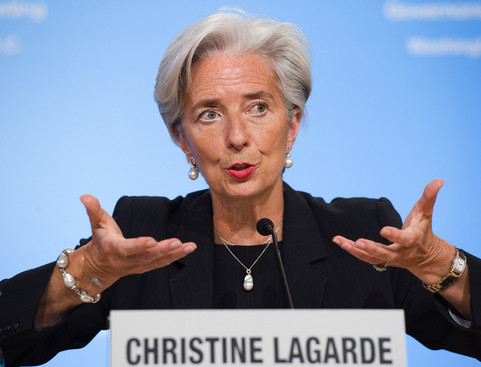IMF puts Greece in tough spot
By Eric Maurice
The International Monetary Fund suspended its participation in the Greek bailout talks on Thursday (11 June) in a dramatic move that could threaten the conclusion of a deal in the coming days and puts the Greek government in a take-it-or-leave it position.
“There are major differences between us in most key areas. There has been no progress in narrowing these differences recently,” an IMF spokesman told reporters in Washington, citing pensions, VAT and financing as the sticking points.
The IMF is, along with the EU and the European central bank (ECB), one of Greece's three lenders holding the key to the release of a €7.2 billion loan to be agreed before 30 June.
Failure to find an agreement on a set of Greek reforms to unblock the loan would leave Greece on the brink of a default.
European markets reacted negatively to the news with the FTSEurofirst 300 index falling immediately by around 0.5 percentage points.
The decision to recall IMF experts from Brussels back to Washington dashed the hopes raised after a meeting on Wednesday night between Greek prime minister Alexis Tsipras, German chancellor Angela Merkel and French president Francois Hollande.
It was announced just when Greek prime minister Alexis Tsipras and European commission president Jean-Claude Juncker were leaving a 2-hour meeting which Juncker said was "important, interesting and friendly".
The main lines of a broader agreement were under discussion.
Under the plan, the current bailout programme would be extended and a €10.9 billion fund earmarked for the recapitalisation or resolution of Greek banks would be used to fund the Greek state.
Questions remained about the duration of the extension.
The Greek government wants a nine-month extension, until March 2016, but a compromise could be found on a three- or six-month extension.
Officials from different sides hoped that the plan would be ready next week and agreed by the eurozone finance minister on 18 June.
But in return for this financial lifeline, Greece would have to agree to the creditors' proposal presented last week and rejected by Tsipras on Friday (5 June).
While an agreement on a 1 percent budgetary primary target was at hand, the Greek government was still refusing to meet the creditors' demands on pensions cuts and a higher VAT rate.
The president of the European council Donald Tusk warned the Greek government on Thursday that it had "to be a little bit more realistic."
"There's no more space for gambling, there is no more time for gambling. The day is coming I'm afraid that someone says that the game is over," Tusk said at a press conference before the IMF announcement.
"This is why I think the upcoming Eurogroup meeting is really crucial and should be decisive. Because we have no more time".
It was unclear Thursday evening whether or under which conditions technical talks could continue without the IMF.
The IMF spokesman left a door open.
"As our managing director has said many times, the IMF never leaves the table," he said, referring to the fund's chief Christine Lagarde, who will participate in next Thursday's Eurogroup.



0 Comments:
Post a Comment
Subscribe to Post Comments [Atom]
<< Home